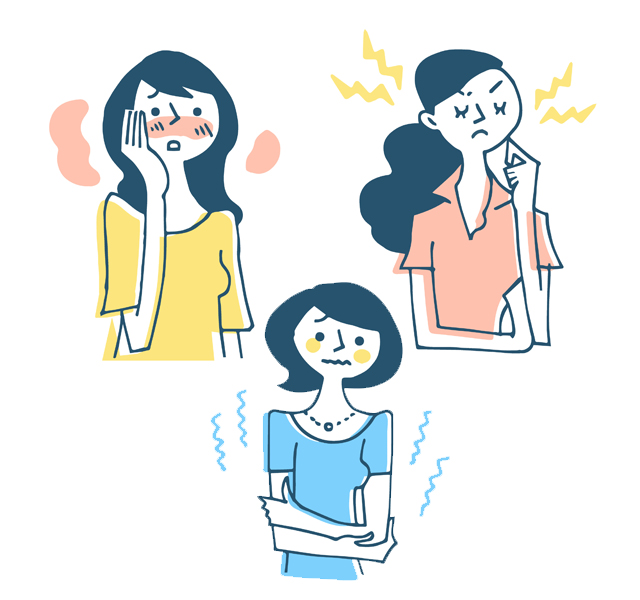Understanding Menopause and Hormone Replacement Therapy
Understanding Menopause and Hormone Replacement Therapy
More than half the population undergoes a life-changing event called menopause, and yet women are woefully uneducated about what is happening to their own bodies. Instead, women suffer in silence, never imagining that the various things that seem to be going “wrong” are all connected to the powerful hormonal changes that can begin as early as our 30s. Understanding what happens during perimenopause and post-menopause will empower women to make better health care decisions.
Hormones are a complex topic, but every woman should have a basic understanding of the role estrogen, progesterone and testosterone play. Estrogen stimulates the development of sexual characteristics like breasts, regulates the menstrual cycle and prepares the uterus for pregnancy. It also plays a key role in proper bone growth, optimizes brain function and regulates mood. Progesterone prepares the uterus for implantation of a fertilized egg and supports pregnancy. It is also necessary for maintaining the nervous system, kidney function, bone health, heart health, the immune system and regulating mood.
Both women and men make both these hormones, as they are important for one’s health. We think of testosterone as fueling male sexual development and characteristics, but both men and women need it. It is important for libido, sexual function, bone density, muscle mass, regulating mood and maintaining brain function, as well as many other vital functions in both sexes.
The transition from perimenopause to post-menopause typically starts in the 40s and takes many years. Perimenopause is the time when your ovaries are running out of eggs and start to shut down, ending your reproductive years. The hormones estrogen and progesterone fluctuate wildly, trying to prepare the body to release an egg in anticipation of fertilization as it has done since the start of menstruation. This fluctuation triggers a cascade of symptoms. Menopause is the point at which you’ve gone 12 months without a period; after that you are considered post-menopause. Women’s hormone levels fall drastically during this time, but as they age, men’s hormones decline more gradually and they notice changes more slowly.
There are estrogen receptors all over your body, which means the loss of hormones can affect your whole body in many ways. Not everyone experiences the same symptoms or the same severity; some women don’t notice much at all. For others, these symptoms can be very distressing and disruptive, impacting how a woman feels about herself and making daily life difficult. Symptoms may improve after menopause for some women, but for others, not so much.
Some common symptoms of perimenopause and/or post-menopause are as follows: irregular menstrual cycles, brain fog or memory problems, low libido, dental issues, hot flashes, night sweats, heart palpitations, mood problems like anger, anxiety, depression or memory lapses, insomnia, breast soreness or tenderness, fatigue, skin problems like acne or dryness, sagging, facial hair, urinary incontinence, overactive bladder or increased urinary tract infections, vaginal dryness, weight changes, joint pain, hair loss, and gastrointestinal issues like constipation, bloating, acid reflux.
Many other conditions share these symptoms, so check with your doctor if you have concerns.
Post-menopause sounds great – no more periods, no worry over getting pregnant, and saving money on contraception and period products. But following menopause, your hormone levels will remain low for the rest of your life unless you receive hormone replacement therapy or HRT, and the loss of estrogen and progesterone has several potential health consequences.
Twenty percent of women will develop osteoporosis after menopause, which significantly increases the risk of hip fractures. Fifty percent of people with a hip fracture die within two years. (Note: More women die from hip fractures than from breast cancer.) Estrogen plays a key role in heart health, so women are at increased risk of developing high blood pressure, high cholesterol and triglycerides, all of which can lead to heart attacks and strokes. Estrogen maintains the tissues of the urethra and bladder; after menopause these tissues can thin, increasing incidences of UTIs or urinary incontinence.
UTIs in older women can be harder to diagnosis and lead to complications, hospitalizations and even death if not treated quickly. Low estrogen leads to a decrease in metabolism, so women burn fewer calories, causing weight gain. Along with low libido, women may experience dryness and painful intercourse. Many women struggle with insomnia and mental health issues like depression, anxiety and loss of self-confidence. The risk of dementia and Alzheimer’s is higher in women, likely due to the sudden loss of hormones.
A study known as the Women’s Health Initiative was published in 2002; it was designed to investigate the effects of HRT on heart disease, breast cancer, osteoporosis and colon cancer. The results of the study, which were misinterpreted, led to fear among women and a decline in the use of HRT.
The good news is there are many evidence-backed treatment options available that can significantly improve your life post-menopause. Focus on lifestyle changes like a healthy diet and doing weight-bearing exercises to keep bones and muscles strong. If you have concerns or questions as you approach perimenopause or menopause, The Menopause Society is a good resource and includes a list of certified providers and specialists in menopause care. Talk with your doctor and ask, “How can the quality of my life improve with hormone replacement therapy?”
(Editor’s note: This is the first in a two-part series on menopause by Occasions’ columnist Lisa Tedder. Next month, she will continue the discussion as she focuses on Hormone Replacement Therapy.)







